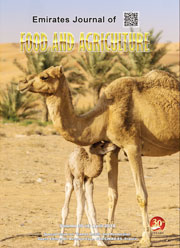Effect of melatonin on ripening of ‘Pearl’ guava fruit at ambient temperature
DOI:
https://doi.org/10.9755/ejfa.2023.v35.i1.2991Abstract
In this study, fruit quality and activities of antioxidant and cell wall degrading enzymes, were investigated to explore the effect of exogenous
melatonin on preservation of postharvest guava during storage at room temperature (25℃). The results showed 500 μM melatonin treatment
could effectively delay the softening and yellowing of guava fruit, and maintain high soluble sugar and vitamin С content, to keep the
appearance and nutrient quality. Moreover, the treatment could inhibit PPO (polyphenol oxidase) enzyme activity to prevent browning,
but promote POD (peroxidase) and CAT (catalase) enzyme activities to improve the resistance of fruit during storage. Furthermore, PG
(polygalacturonase) and PL (pectate lyase) enzyme activities were effectively suppressed to protect the structural integrity of the cell
wall in fruit, and delay the softening process. These findings indicate, 500 μM exogenous melatonin treatment could delay the ripening
of postharvest guava fruit, and present application value of preservation.










 .
. 